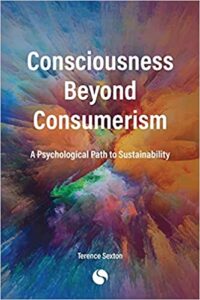A new book from our friend Terry Sexton, and well worth reading if you’ve enjoyed our book Rebuild: the Economy, Leadership, and You.
Terry’s book provides a complementary take on the same span, but with more emphasis on adult development. On how to develop the new consciousness we need if we are to build a world beyond today’s consumerism.
There is some common ground: for example, he also uses the Kegan framework of adult development, as we do; though we use the modified version from Otto Laske that integrates Kegan’s socio-emotional development with the cognitive development from logical into dialectical thinking.
He starts the book exactly where I started, the trigger for me to leave P&G 13 years ago to focus on building a world that works for all by building whole businesses and business ecosystems: I never wanted to say, if someone asks me in 2020, or even more so in 2030, “what were you doing when it became clear that the world was starting to burn?”
Terry starts with:
What if one day my grandchildren ask me ‘What did you do when
you knew?’ Would my answer be, ‘I did nothing’?
I am not an economist, politician, ecologist or environmentalist. I
am a psychologist. I cannot save the planet. So, I carried on with business
as usual. But the poem would not leave me. The line ‘what did you do
once you knew?’ became an earworm until, one day, logic hit:
Our society is unsustainable.
Who creates our society? Our leaders.
Therefore, our leadership is unsustainable.
What is my work? I develop leaders.
I must be part of the problem.
If I am part of the problem, I can also be part of the solution.
He ends with one of the themes running through our book as well: holding opposites as one complementary pair in our mind.
As you have read this book, you have probably disagreed with some
of what I have written. Some of my arguments could be perceived as
controversial. If this is the case, I invite you to hold your views and
mine in your mind simultaneously. Even though our views may be
contradictory, could they both be right? You will recall being able to
hold contradictory views without conflict is one of the characteristics of
consciousness beyond consumerism.
And to get from his starting line to his finishing line, he weaves around the threads of separation, looking at how we have become apart from each other, from nature, from an economy that works; and how our consciousness has led to us building the constructs we are now living in.
Of course, diagnosis is no use without a way out; and Terry offers that in the second half of the book, offering insight into what each of us can do to develop our consciousness and be part of the solution to our global challenges.
All told, well worth reading if you’ve read Rebuild!
